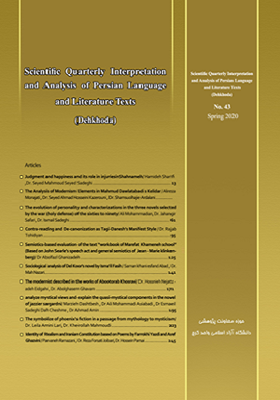Identity of Realism and Iranian Constitution based on Poems by Farrokhi Yazdi and Aref Ghazvini
Subject Areas : Persian language and literature textsParvaneh Ramezani 1 , reza forsati joybari 2 , hossein parsaeei 3
1 - PhD Student of Persian Language and Literature, Ghaemshahr Branch, Islamic Azad University, Ghaemshahr, Iran.
2 - Assistant Professor of Persian Language and Literature, Ghaemshahr Branch, Islamic Azad University, Ghaemshahr, Iran
3 - Assistant Professor of Persian Language, Ghaemshahr Branch, Islamic Azad University, Ghaemshahr, Iran
Keywords: Revolution, Farrokhi Yazdi, Constitution, انقلاب, عارف قزوینی, فرّخی یزدی, Aref Ghazvini, هویّت رئالیسم, مشروطیّت, Realism Identity,
Abstract :
Realism is a literary school of thought, influencing, objective and external emerging in mid-19th century in France and spreading rapidly while attracting the poets, authors and artists toward itself. In Iran also, concurrent with the movement of the constitutionalists, some transformations occurred in the elements of Iranian identity bestowing in terms of identity and the poets and authors paid attention to their national identity and the decline and retardation of their country. Farrokhi Yazdi and Aref Gazvini the revolutionary poets of this era, strongly inclined to liberation and supporting the laborers and farmers, they’ve demonstrated their attention to the status of the country. Applying content analysis method, (Descriptive- Analytical) the present study aims to analyze and outline the extent of the focus on the identity components of the revolutionary realism in the poems of the constitution Era realist two poets. For this reason, the identity components of realism their poetry has been analyzed. The present study findings indicated that Farrokhi Yazdi focused particularly on the branches and components of revolutionary realism and through benefitting from various representations of ritual (Islamic) and national perseverance literature, constitution Era realist poets encourages theire audience to fighting and opposition.
کتابها
10. سیّد حسینی ، رضا (1385) مکتبهای ادبی، تهران: نگاه.
11. عارف قزوینی، ابوالقاسم (1347) کلیّات دیوان، تدوین سیف آزاد، انتشارات امیرکبیر.
12. عارف قزوینی، ابوالقاسم (1381) دیوان عارف قزوینی، تدوین محمّدعلی سپانلو و مهدی اخوّت، تهران: نگاه.
13. فتحی، نصرالله (1390) عارف و ایرج، تهران: چاپ خش.
14. فرّخی یزدی، محمّد (1357) دیوان فرّخی یزدی، به اهتمام حسین مکّی، تهران، انتشارات امیرکبیر.
15. فرّخی یزدی، محمّد (1363) دیوان فرّخی یزدی، به اهتمام حسین مکّی، تهران: امیرکبیر.
16. گل محمّدی، احمد (1381) جهانی شدن؛ فرهنگ و هویّت، جلد1، تهران: نشرنی.
17. لیتل، دانیل (1386) تبیین در علوم اجتماعی، ترجمه: عبدالکریم سروش، تهران: صراط.
18. محمّدی، حسنعلی (1375) شعر معاصر ایران از بهار تا شهریار، جلد 1، تهران: ارغنون.
19. مسرّت، حسین (1384) پیشوای آزادی، تهران: رهنما.
20. میرزایی، حسن (1386) مبانی فلسفی تئوری سازمان، تهران: سمت.
21. مهرور، زکریا (1382) عارف قزوینی، تهران: علمی.
22. نرودا، پابلو (1393) مجموعه اشعار پابلو نرودا، ترجمۀ سیروس شاملو، تهران: نگاه.
نشریهها و مقالهها
23. ابوالحسنی، سیّد رحیم (1386) مولّفههای هویّت ملّی؛ با رویکرد پژوهشی، فصلنامه سیّاست، ش38، صص22-1.
24. حسنی، سیّد حمیدرضا (1385) مناسبات بین فهم و تبیین در علوم انسانی و علوم طبیعی، حوزه و دانشگاه- روششناسی علوم انسانی، ش 47، صص 7-5.
25. فتوحی، محمود (1375) شکلگیری رئالیسم ایرانی، در ]کنفرانس بین المللی جایگاه زبان و ادبیّات فارسی در بنگلادش[، 2006 دانشگاه داکا بنگلادش، 6-7 خرداد 1375، صص 17-15.
26. موحّد ابطحی، سید محمّدتقی (1385) گزارشی از کارگاه آموزشی پارادایمهای علوم انسانی ، حوزه و دانشگاه. روششناسی علوم انسانی، سال دوازدهم، ش 48، 154- 135.
27. نوچه فلاّح، رستم (1383) هویّت؛ واقعیّتی ثابت یا سیّال، مبانی نظری هویّت و بحران هویّت، علیاکبر علیخانی، تهران: پژوهشکده علوم انسانی و اجتماعی جهاد دانشگاهی،صص39-35.
_||_


